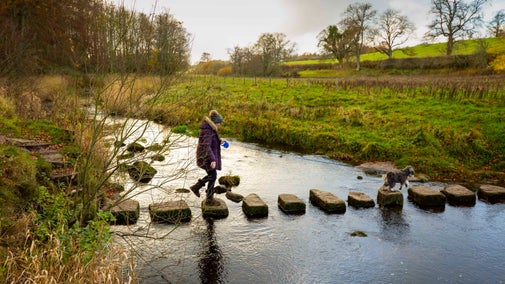
Discover more at Copt Hall Marshes
Find out how to get to Copt Hall Marshes, where to park, things to see and do and more.

A wildlife-rich working farm on the remote and beautiful Blackwater Estuary, Copt Hall Marshes balances arable crop production with coastal nature conservation.
These Essex marshes offer peace and quiet for those wanting to get away from the hustle and bustle of modern living. There are marked visitor routes around the farm, though these can become wet and muddy in winter. Whether you're a photographer or artist, love wildlife or just fancy stretching your legs, you're sure to enjoy your visit.
The Blackwater Estuary is home to a variety of wildlife. Insects such as bees, butterflies, beetles and crickets thrive here thanks to the nectar-rich field margins and wildflower strips. Look out for the rare Fisher's Estuarine moth, which is thriving in a plot of planted sea hog's fennel. Copt Hall Marshes is also home to less-friendly species such as adders.
The most visible presence here are the thousands of wildfowl and wading birds, including Brent and white-fronted geese, curlews, golden plovers, teals and widgeons. Birds of prey including barn and short-eared owls, kestrels, buzzards and harriers hunt over the marshes.
A host of farmland birds can also be spotted here, including breeding skylarks, corn buntings, yellow wagtails, whitethroats, cuckoos and yellowhammers. Meanwhile, the salt marsh is home to breeding redshanks and oystercatchers.
Why not take a break and scan the fields from the vantage point of the bird hide.

The sea wall was built two centuries ago as a means to claim land for grazing livestock. The dykes that were created when extracting the clay to build it now form habitats for water voles, dragonflies, water birds and other wildlife.
An area of wetland that lies between land and sea, salt marsh provides a vital habitat for a huge range of animals and plants that have adapted to live in the salty water. It also offers a range of environmental benefits, helping to manage floods, reduce tidal energy and lock away carbon.
Salt marsh habitats across the East of England are under threat from rising sea levels and climate change. To protect Copt Hall Marshes, please keep to the marked trails.
The local villages of Peldon and Tolleshunt D'Arcy both have good pubs, should you fancy some refreshments or a bite to eat. You're advised to use the toilet while you're there, as there are no toilets at Copt Hall Marshes.
Dogs are welcome as long as they're kept on leads or under close control. Please help care for Copt Hall Marshes' wildlife and livestock by using the signed routes. In the winter, large flocks of geese and waders roost and feed on the fields, and they're easily disturbed.
Picking up your dog’s litter will keep the area clean for everyone – please pop it in the bin in the car park. While lots of us love dogs, others don't, so please don't let your four-legged friend run up to other people, especially children.
On 24 September 1916, a German L33 super-Zeppelin crashed at Copt Hall Marshes. Returning from a bombing raid over London's East End, the Zeppelin was attacked by the RAF above Chelmsford and came down within feet of a farm labourer's cottage.

Find out how to get to Copt Hall Marshes, where to park, things to see and do and more.

Discover the 780 miles of beautiful coastline in our care. Plan your next coastal adventure, whether you want to explore soft, sandy beaches or rugged, windswept cliffs.

While canoeing and kayaking are great ways to experience nature and keep fit, they can be dangerous if you don't follow the guidelines. Learn how to stay safe with our advice and guidance.

Try out the ‘50 things to do before you’re 11¾’ activities children can enjoy by the sea, from paddling or swimming, to catching crabs and skimming stones.

Plan a visit to one of the special countryside places in our care and discover the benefits of being in the great outdoors. Pack your walking boots and get ready to explore woodlands, valleys and rivers.

Explore some of the finest landscapes in our care on coastal paths, accessible trails, woodland walks and everything in between. Find the best places to walk near you.

Explore an ancient forest, acres of chalk grassland and other hidden countryside spaces around Essex, Bedfordshire and Hertfordshire.